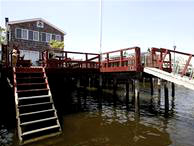|
|
|
Katrina storm surge insurance case remanded
Breaking Legal News |
2006/12/28
|
| US Senior District Judge L.T. Senter Jr. of the US Southern District of Mississippi remanded to Mississippi state court Wednesday a key Hurricane Katrina case involving whether insurance exclusion clauses for flood damage mean that storm surge damages are excluded as well. With state courts being typically more plaintiff-friendly in interpreting such insurance clauses, Mississippi Attorney General Jim Hood said the ruling was a step towards a fair resolution for the people of Mississippi, and used the opportunity to again call for the insurance companies, including State Farm, Allstate, and Nationwide to negotiate a settlement, as well as make a public call for national insurance reform. The case will now be heard by Judge Denise Sweet Owens in the Chancery Court of Hinds County. There have been numerous Katrina-related insurance cases in Mississippi over the past year. In August, Judge Senter ruled that Nationwide Insurance was not obligated to cover a policyholder's claims for water damage caused by the hurricane because “provisions of the Nationwide policy that exclude coverage for damages caused by water are valid and enforceable terms of the insurance contract†and “similar policy terms have been enforced with respect to damage caused by high water associated with hurricanes in many reported decisions.†|
|
|
|
|
|
|
Class action or a representative action is a form of lawsuit in which a large group of people collectively bring a claim to court and/or in which a class of defendants is being sued. This form of collective lawsuit originated in the United States and is still predominantly a U.S. phenomenon, at least the U.S. variant of it. In the United States federal courts, class actions are governed by Federal Rules of Civil Procedure Rule. Since 1938, many states have adopted rules similar to the FRCP. However, some states like California have civil procedure systems which deviate significantly from the federal rules; the California Codes provide for four separate types of class actions. As a result, there are two separate treatises devoted solely to the complex topic of California class actions. Some states, such as Virginia, do not provide for any class actions, while others, such as New York, limit the types of claims that may be brought as class actions. They can construct your law firm a brand new website and help you redesign your existing law firm site to secure your place in the internet. |
Law Firm Directory
|
|





